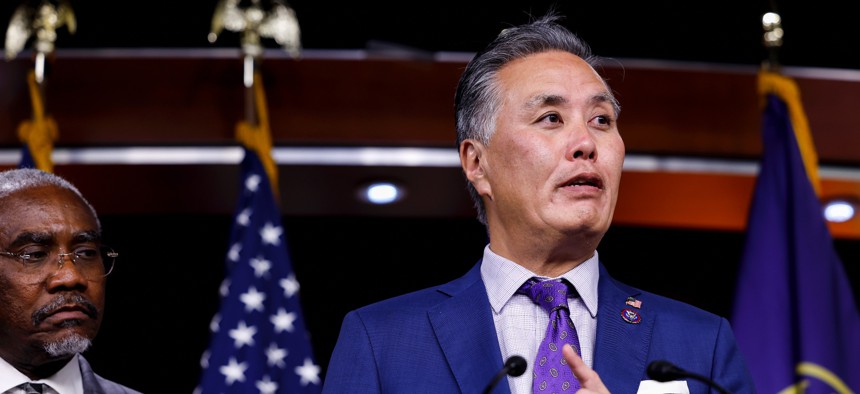House Dem pushes back on bill to cancel VA's $20B-plus software refresh

House Veterans Affairs Committee Ranking Member Mark Takano (D-Calif.) disputed legislation Monday that calls for the cancellation of the VA's Electronic Health Modernization Program in favor of its legacy system. Anna Moneymaker / Getty Images
Rep. Mark Takano, now ranking member on the House Veterans Affairs Committee, doesn't want to cancel the Electronic Health Records Modernization program without a ready alternative – and VistA doesn't count.
The top Democrat on the House Veterans Affairs Committee sounded off on Monday against legislation that would cancel the VA's $20 billion-plus Electronic Health Modernization Program if certain performance benchmarks are not met.
Rep. Mark Takano (D-Calif.) said he did not agree with legislation introduced by Rep. Matt Rosendale (R-Mont.) to eliminate the program and block new task orders on the 10-year software contract with Oracle Cerner.
"We were able to pass bipartisan IT reform and EHRM cost accountability last Congress. To that end, I don't agree with completely canceling the EHR program without a viable solution to replace it," Takano said in an emailed statement. "Canceling a contract is not going to fix the larger issue of VA's lack of progress with IT modernization and poor program management stemming from the sole-source award by the Trump administration in 2018. I want to get this right, America's veterans and VA staff deserve a modern EHR that works."
Rosendale's bill proposes reverting VA's clinical system to the homegrown Veterans Health Information Systems and Technology Architecture electronic health record. Takano is on record as considering VistA a bad choice for the future.
"Continuing with VistA is not sustainable long term," Takano said at a subcommittee hearing in July 2022. "Let me say it again. I do not believe that continuing with VistA is sustainable in the long term."
At the same hearing, Takano said that the implementation of the new health record has been problematic from day one.
"I can only surmise that from its inception, the program management structure overseeing this deployment is completely wrong for VA," Takano said in July. "The Office of Electronic Health Record Modernization has been a failure. I have no confidence that our committee nor the secretary has been given an honest and accurate picture of how things are going by the program's leadership, nor have we been from the start."
HVAC Chairman Rep. MIke Bost (R-Ill.) proposed legislation at the end of January proposing that the Oracle Cerner software hit certain performance targets, including 99.9% uptime for four consecutive months, before new deployments are authorized.
Currently the Oracle Cerner system is live at a handful of VA clinical sites and new installations are on pause until July when a large Ann Arbor, Mich., facility is set to go live with the new health record. The pause was initiated after a flurry of oversight reports found that VA clinicians were trying to accommodate weaknesses in the system with manual workarounds that led to errors and potentially put patients at risk.
The House bills landed days after the pilot site of the VA's Oracle Cerner system in Spokane, Wash., suffered a service interruption because of updates being made to the overall system by the Department of Defense.
VA Secretary Denis McDonough, who inherited the EHRM program from the Trump administration, said that during the current "assess and address" period the agency was looking at how the question of the joint VA-DOD records system was being managed.
"Too often we're a downstream consumer of this infrastructure. And too often our concern becomes secondary to, for example, DOD, which manages big parts of the network. This makes implementation of the system harder than it might otherwise be," McDonough said on Jan. 31. The situation, he noted, "brings forward the question of whether our concerns are being addressed as a first order question, or whether they're somehow derivative of DOD concerns."






